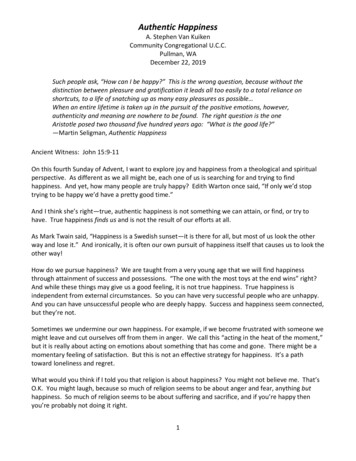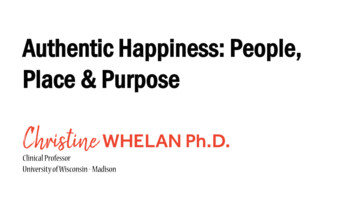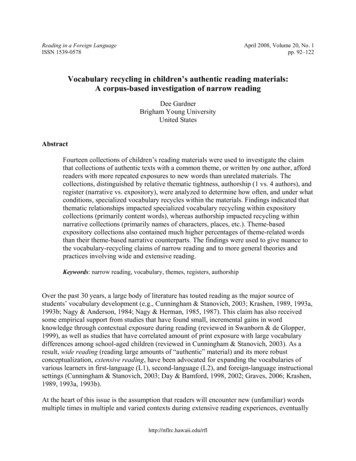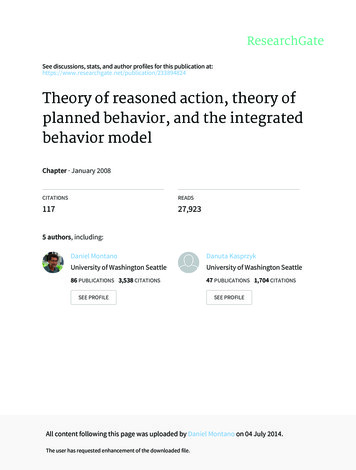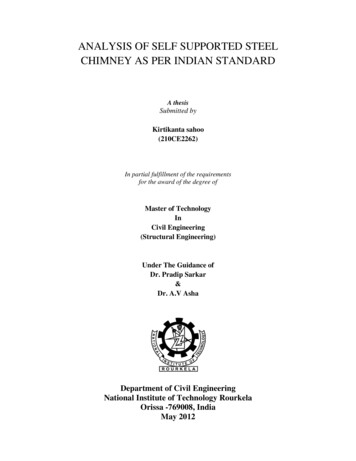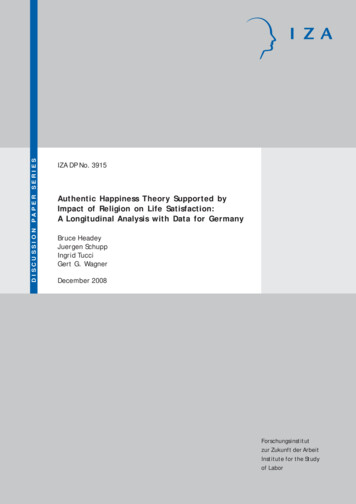
Transcription
DISCUSSION PAPER SERIESIZA DP No. 3915Authentic Happiness Theory Supported byImpact of Religion on Life Satisfaction:A Longitudinal Analysis with Data for GermanyBruce HeadeyJuergen SchuppIngrid TucciGert G. WagnerDecember 2008Forschungsinstitutzur Zukunft der ArbeitInstitute for the Studyof Labor
Authentic Happiness Theory Supported byImpact of Religion on Life Satisfaction:A Longitudinal Analysis with Data for GermanyBruce HeadeyDIW Berlin and University of MelbourneJuergen SchuppDIW Berlin, Free University Berlin and IZAIngrid TucciDIW Berlin and University of GoettingenGert G. WagnerDIW Berlin, Berlin University of Technology,Max Weber Institute for Advanced Studies, Erfurt,Max Planck Institute for Human Development, Berlinand IZADiscussion Paper No. 3915December 2008IZAP.O. Box 724053072 BonnGermanyPhone: 49-228-3894-0Fax: 49-228-3894-180E-mail: iza@iza.orgAny opinions expressed here are those of the author(s) and not those of IZA. Research published inthis series may include views on policy, but the institute itself takes no institutional policy positions.The Institute for the Study of Labor (IZA) in Bonn is a local and virtual international research centerand a place of communication between science, politics and business. IZA is an independent nonprofitorganization supported by Deutsche Post World Net. The center is associated with the University ofBonn and offers a stimulating research environment through its international network, workshops andconferences, data service, project support, research visits and doctoral program. IZA engages in (i)original and internationally competitive research in all fields of labor economics, (ii) development ofpolicy concepts, and (iii) dissemination of research results and concepts to the interested public.IZA Discussion Papers often represent preliminary work and are circulated to encourage discussion.Citation of such a paper should account for its provisional character. A revised version may beavailable directly from the author.
IZA Discussion Paper No. 3915December 2008ABSTRACTAuthentic Happiness Theory Supported byImpact of Religion on Life Satisfaction:A Longitudinal Analysis with Data for Germany*Using data from the German Socio-Economic Panel Survey (SOEP), this paper assesses therelationship between life satisfaction and religious practice. The main new result here islongitudinal. It is shown that individuals who become more religious over time record longterm gains in life satisfaction, while those who become less religious record long term losses.This result holds net of the effects of personality traits, and also in fixed effects panel models.The paper has significant implications for the dominant, paradigm theory in SWB research,namely set-point theory. This theory holds that the long term SWB of adult individuals isstable, because SWB depends on personality traits and other stable genetic factors. It isalready clear from the German panel data that about 20% of the population have recordedlarge long term changes in SWB. New evidence in this paper and elsewhere about theeffects of consciously chosen life goals, including religious ones, on SWB is hard to reconcilewith set-point theory. It is more in line with authentic happiness theory.JEL Classification:Keywords:A12, A13, Y80, Z12SWB, life satisfaction, set-point theory, authentic happiness theory,longitudinal analysis, SOEPCorresponding author:Gert G. WagnerDIW Berlin10108 BerlinGermanyE-mail: gwagner@diw-berlin.de*We would like to thank Christa Fricke and Sybille Meyer for valuable comments on a previous draft.We are grateful to Philipp Wagner who provided analyses of data of a special SOEP-Study in 2008.
1Research QuestionThe dominant, paradigm theory in SWB research (research on subjective well being) isset-point theory. This theory holds that the long term SWB of adult individuals is stable,because it depends on personality traits and other stable genetic factors. It is already clearfrom the German panel data that about 20% of the population have recorded large longterm changes in SWB (Headey, 2006, 2008a). New evidence about the effects ofconsciously chosen life goals, including religious ones, on SWB is also hard to reconcilewith set-point theory as currently understood. It is more in line with authentic happinesstheory (Petersen and Seligman, 2004). After a brief discussion of set-point and authentictheory of SWB, the paper assesses the relationship between life satisfaction and religiousbelief and practice. Using data from the German Socio-Economic Panel Survey (SOEP),it shows linkages between long term changes in religious practice and changes in lifesatisfaction.1.1Emerging problems in set-point theorySet-point theory has or had all the marks of a paradigm theory for the field of SWB(Kuhn, 1962). It developed cumulatively over the last thirty years, originally going underthe label of adaptation-level theory (Brickman and Campbell, 1971), and appeared toprovide an integrated account of linkages between genetic traits, including personalitytraits, life events and SWB (Brickman, Coates and Janoff-Bulman, 1978; Costa andMcCrae, 1980; Headey and Wearing, 1989; Lykken and Tellegen, 1996).Arguably, however, the theory is now beginning to show serious deficiencies. Its majorclaim and prediction is that, despite transitory fluctuations, long term SWB does notchange. Life events produce temporary fluctuations, but the theory claims that adultssoon revert to the SWB set-points accounted for by their unchanging personality traits,notably their levels of extroversion (E) and neuroticism (N).In fact, the central proposition that long term SWB does not change had never, untilrecently, been directly tested. The German Socio-Economic Panel Survey (SOEP), based3
on annual interviews with a large representative national sample, has now been runningfor over twenty years and is the first dataset to enable a direct test. The evidence fromSOEP is that about 20% of the West German prime age adult population have recordedlarge and apparently permanent changes in their levels of SWB. Taking five-yearaverages of life satisfaction in order (largely) to eliminate the effects of transitory annualfluctuations, it transpires that 20% recorded changes of two or more points on a standard0-10 life satisfaction scale; close to one and a half standard deviations (Fujita and Diener,2005; Headey, 2006, 2008a). These changes were enough to move them, for example,from the 25th to above the 75th percentile of the SWB distribution, or vice-versa. Manymore individuals recorded substantial but lesser changes. Altogether, 35% recordedchanges of one standard deviation of more, when their life satisfaction score in 2000-04is compared with 1985-89.The new evidence from SOEP cannot readily be reconciled with set-point theory ascurrently understood. The challenge in developing a new or revised theory is to accountfor the minority who record substantial changes in long term SWB, as well as for themajority who show little or no change.Obviously, in any new theory, stable personality traits, which are the linchpin(s) of setpoint theory, will still have an important role to play. But it is important to realise thatthese traits are usually regarded as accounting for 40-50% of the variance in SWB,although estimates differ widely (Huppert, 2005; Lucas, 2008; but see Lykken andTellegen, 1996 for a higher estimate). The SOEP data, in fact, reveal that there aresubstantial minorities of individuals who have personality traits which would seem topredispose them to low levels of long term SWB, but who actually record high levels.For example, among those recording what is usually thought of as the worst possiblecombination of traits for SWB – below the mean on E and above the mean on N – 27.0%were in the top two quintiles of life satisfaction in 2000-04 and 11.7% were in the top4
quintile. Clearly, then, other variables besides personality traits must play a significantrole in accounting for SWB, and especially in accounting for long term change.11.2Authentic happiness theoryAn emerging body of theory which is certainly intended to account for and promote longterm change in SWB is authentic happiness theory (Petersen and Seligman, 2004;Lyubomirsky, King and Diener, 2005; Seligman, Parks and Steen, 2005). Authentichappiness theorists, who are mainly psychologists, are critical of what they regard as theexcessive focus of mainstream SWB theory on satisfaction and pleasure. Their theoryhas strong moral, sometimes biblical or Christian overtones, but is nevertheless clearlyempirically testable.They hypothesise that high levels of long term SWB come from a life characterized bymeaning and engagement, as well as pleasure (Seligman, Parks and Steen, 2005). Lifewill only appear meaningful to the individual, and will only be satisfying in the longterm, if his/her goals or priorities in life are pro-social (altruistic) and are perceived tohave intrinsic value, rather than being purely self-oriented and materialistic. Effectiveengagement in pursuit of these goals/priorities is hypothesized to benefit from thedevelopment of various character strengths, which include gratitude, humility andforgiveness (Petersen and Seligman, 2004). Religious beliefs and behaviours are viewedby many authentic happiness theorists as a valid approach towards achieving long termSWB (Petersen and Seligman, 2004; Myers, 2008).Authentic happiness theorists (and others) have conducted both observational andintervention studies designed to test their main hypotheses. Here we briefly reviewevidence about links between SWB and pro-social goals and behaviours, with particularfocus on religion. Lyubomirsky, Sheldon and Schkade (2005) conducted an experiment1Personality variables themselves may play a modest role in accounting for change. Headey (2006), againusing the SOEP data, reported that people who rate both high on E and low on N are more likely thanaverage to record long term gains in life satisfaction. Individuals who score low on E and high on N aremore likely to record a long term decline in life satisfaction.5
in which subjects performed random acts of kindness on a daily basis. Their feelings ofpositive affect immediately improved and the effect lasted several weeks. Fredrickson(2008) conducted a series of studies of subjects with high levels of positive affect,whether observed or experimentally induced, and found that they recorded improvedperformance in a wide range of tasks. Exercises involving gratitude (‘counting yourblessings’) have been found to prolong feelings of positive affect and lengthen the periodbefore reversion to an SWB baseline or set point occurs (Emmons and McCullogh, 2003;Frederickson and Joiner, 2002).In a recent thorough review of links between SWB and religious beliefs and behaviours,Myers (2008) reports that almost all cross-sectional studies have found positive crosssectional correlations. Generally, the correlations between life satisfaction and religiouspractice appear to be in the 0.10 to 0.15 range. Further, religious people appear to copebetter with stressful life events (Myers, 2008; Clark and Lelkes, 2008), and achieve thispartly by finding greater meaning in the events and lessons to be learned from them(Niederhoffer and Pennebaker, 2002; Lyubomirsky, Sheldon and Schkade, 2005).Religious people tend to have a relatively healthy lifestyle (better diet, less smoking anddrinking) and partly for that reason they live a few years longer than average (Myers,2008). They more commonly serve as volunteers than other citizens and volunteering isassociated with somewhat higher SWB (Harlow and Cantor, 1996; Thoits and Hewitt,2001). It is perhaps worth noting, in this context, that brain imaging research appears toindicate that altruistic and cooperative behaviours, especially if reciprocated, are directlygratifying and stimulating to the same areas of the brain as sexual activity and otherpleasurable interactions (Rilling et al, 2004).6
2Research plan: Linking authentic happiness theory to set-point theory andlong term SWB by analyzing the effects of religious beliefs and activitiesIt is clear that the authentic happiness school is assembling an increasingly impressivebody of supporting evidence. At this stage, however, the evidence has several limitationsin contributing to a theory of long term SWB. First, much of it comes from interventionstudies which demonstrate only short term effects on changes in SWB. Secondly, thelinks between SWB and pro-social or religious goals and behaviours are quite modest.Thirdly, nearly all of the studies report these links to SWB without controlling forpersonality traits. Personality variables should clearly be regarded as temporally andcausally antecedent to life goals, so in principle they should be controlled. This iscertainly essential in the context of contributing to development of a long term theory ofSWB.In a recent paper on life goals/priorities, using the long term German panel data, the firstauthor attempted to deal with some of these issues (Headey, 2008b; see also Diener andFujita, 1995). It was shown that individuals who persistently, over a period of years,pursue pro-social goals register long term gains in life satisfaction, whereas those whopursue self-oriented success and material goals register declines in life satisfaction (seealso Nickerson et al, 2003; Diener and Seligman, 2004). These linkages held, controllingfor the personality traits E and N. However, as expected, links between life goals andSWB (and changes in SWB) remained modest, although statistically significant at the0.001 level.In theorising about why pro-social goals can enhance SWB, it was suggested that prosocial goals are non-competitive or non-zero sum (my gain does not detract from yourgain, and may even increase your gain), so many people can become better off at thesame time. By contrast, material and success goals are generall
Authentic happiness theorists (and others) have conducted both observational and intervention studies designed to test their main hypotheses. Here we briefly review evidence about links between SWB and pro-social goals and behaviours, with particular focus on religion. Lyubomirsky, Sheldon and Schkade (2005) conducted an experiment 1 Personality variables themselves may play a modest role in .
